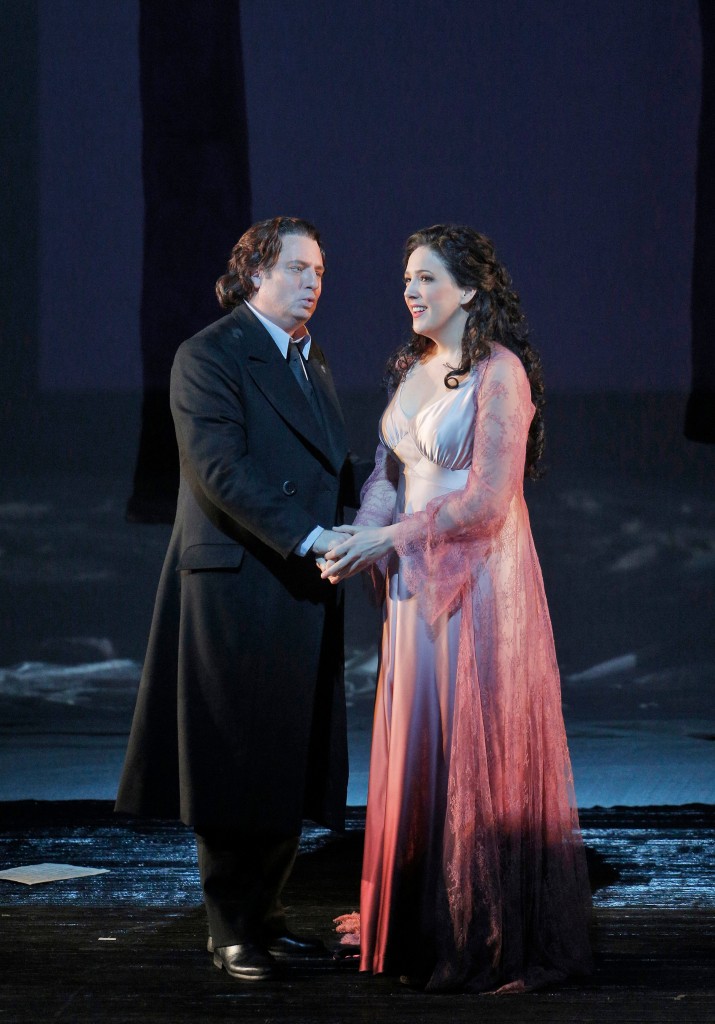Lacking lovers make for uneven second-cast “Hoffmann”

Matthew Polenzani and Susanna Phillips in “Les Contes d’Hoffmann” at the Metropolitan Opera. Photo: Cory Weaver
Les Contes d’Hoffmann may focus on one self-obsessed poet, but it remains an ensemble piece nonetheless. The Metropolitan Opera’s second cast of the season is not the most even that the company has fielded, but there is more than enough talent in the current lineup to give Offenbach’s tale of romantic frustration is sinister sparkle.
The love interests, as is common, are split among three ladies, and Thursday wasn’t a particularly good night for any of them. There was little charm to Audrey Luna’s portrayal of the automaton Olympia: her physicality was unconvincing, and in the Doll Song her tone was shrill and her intonation all over the map. No better as the courtesan Giulietta was Elena Maximova, whose ungainly wobble crushed what had started out as a spellbinding Barcarolle.
Even the usually formidable Susanna Phillips was less than her best self, singing the role of the innocent Antonia. A slightly constricted top in “Elle a fuit, la tourterelle” eventually softened up nicely, showing gorgeous color in her middle voice. Things got out of hand later on, though, as she seemed to get lost on one iteration of “C’est une chanson d’amour,” and she struggled to produce any high notes at all towards the end of her act.
The singers who were in it for the long haul fared much better, starting with Matthew Polenzani as the poet of the title. The tenor might not have the world’s most perfect instrument, but he uses it like a true master, always producing a crisp, energetic sound. He sang on Thursday with a strong, bronzed tone that never threatened to break, despite the constant, obsessive passion that he brought to the character.
As his masquerading sidekick Nicklausse, Karine Deshayes brought to the stage a strong presence and stronger voice, singing with more body and smoke than one often hears in this particular role. The most notable holdover from the season’s earlier cast, Tony Stevenson was again superb as the four servants, his comic chops and variety enlivening all of the characters, bolstered by a solid, creamy tenor.
The biggest upgrade from the first cast by far is Laurent Naouri, who is just about everything one could ask for playing the four villains. One moment of poor direction as Coppélius aside, his portrayals were delightfully slimy. Just as important, he has the vocal authority to sing all four roles, a cavernous voice with plenty of body at its root and thundering power up top.
Among the comprimarii, Margaret Lattimore stood out for her plush, velvety sound in her appearance as Antonia’s mother. David Crawford’s swagger and muscular tone as Schlémil garnered a few catcalls from an admirer upstairs.
The Met’s version of the score, assembled in part by James Levine himself, ruffled feathers when it was first heard, but Levine made a strong case for it on Thursday. It is still an amazing experience to watch him conduct—even from the audience, his beat and his intentions are absolutely crystal-clear. It’s just as amazing, of course, to hear what comes out of the orchestra—the musicians showed a prismatic array of colors, and their playing was always precise yet anything but routine.
Les Contes d’Hoffmann runs through March 21 at the Metropolitan Opera. Jennifer Johnson Cano replaces Karine Deshayes as Nicklausse on March 21. metopera.org


